Rod Rees's Blog, page 3
September 30, 2013
UTOPIA VS DYSTOPIA: A WRITER'S DILEMMA
UTOPIA VS DYSTOPIA: THE SF WRITER’S DILEMMA
I was asked to speak at the Zagreb Literary Festival last week and as a result found myself on a panel discussing the subject ‘New Utopias’.
I have to say it was a subject that left me a little flummoxed and the reason was simple: I had never thought about writing a story that had anything other than a dystopian setting. Utopias seemed … boring. Sitting in one of Zagreb’s wonderful open air cafes enjoying a beer and the late summer sunshine I got to wondering why this should be.
I suppose the obvious answer is that a dystopia offers much more plot traction than a utopia – I mean a world where everything is hunky-dory is hardly one to get the adrenaline pumping – but maybe there’s more to it than that. Maybe humanity (and despite what they might believe, SF writers are at least part human) is frightened of utopias, a contrary thought especially when I find myself living in a world obsessed with global warming, rising sea-levels, terrorist atrocities, melt-down in the Middle East to name just a few of the current disasters de jour.
But this alarmist tendency is in itself odd especially as, since the Second World War, things have taken a distinct turn for the better: there have been no world wars (and the casualties sustained in the ‘regional wars’ are as nothing when contrasted to their pre-war equivalents), the standard of living of most people has improved beyond recognition (check out India and China as examples of that), contagious diseases like smallpox and polio have been mastered, and the world (on balance) is a much more tolerant place free of maniacal dictators. But pessimism is still rife.
Why?
And the more I considered this conundrum the more I came back to the idea that humanity is frightenedof living in a perfect world. So what are the features of a utopia that frighten people? These are my thoughts on the subject aka Rod Rees’ Vision of Utopia:
· A utopia would be a perfect meritocracy where talent and effort are the sole determinants of success and of position in society. Not something most of society would embrace. I suspect (and I’m no biologist) that humankind has a pre-disposition to promote the pan-generational success of the family for the simple reason that by doing so the long-term propagation of the family’s DNA is enhanced. This is why inheritance of wealth and status looms so large in human history (most wars have been fought to ensure the survival of one ruling clan or another). A utopian society would render this scramble to hereditary success obsolete.
· A utopia would be a society where you could believe and act in whatever way you chose as long as these do not impinge on any contrary/conflicting beliefs or actions espoused by other members of society. Of course, this is flies in the face of politico-religious reality. Politico-religious systems are evangelical in nature: you’ve only to see how avidly elections are fought to recognise that. A politico-religious system wants/needs adherents and the more of them it can get, the better. There’s a competitive aspect to all this too: all politico-religious systems are triumphalist … half of the joy of winning is the sight of the other party losing. A utopia would see the peaceful co-existence of all belief systems, an idea which is, well, utopian in its stupidity. Everyone loves a winner … draws are boring.
· A utopian society would be one where there was no privacy. Of course, to ensure the perfection of a utopian world everything must be known, there can be no secrets and no privacy – and why should there be any when there is no criticism or condemnation. But privacy and secrecy is the bedrock of society …
Reading this I am struck by the thought that, believe it or not (like it or not) the world is en route towards a utopian existence.
The rise of the cyber-algorithmic manipulation of human affairs will inevitably mean that jobs based on rote-learning and experience (doctors, pharmacists, truck drivers etc.) will be made redundant and only those of us with a mathematical bent will have any real influence (the Pareto Principle applied to society). This would create the ultimate meritocracy: inherited wealth/power would be trumped by brain power.
The world hasbecome a more tolerant place, this attested to by the burgeoning acceptance of gender equality, of gay rights and the increasing secularisation of society.
And finally, the increasing and increasingly pervasive nature of surveillance means that privacy is, to all intents and purposes, dead.
Yeah, utopia here we come.
I was on my third beer when the answer to my puzzle suggested itself. SF writers steer clear of utopias because they’re a damned sight more frightening then dystopias … and a damned sight more likely to occur.
Published on September 30, 2013 07:28
September 29, 2013
THE DEMI-MONDE INSPIRES ART!
It seems that the Demi-Monde has inspired and artist. When I attended the Zagreb Literary Festival there was some artwork on display by a Croatian artist , Martina Grlic. Here are a couple of Martina's works:
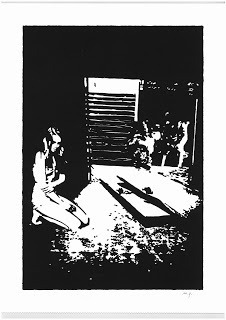
This shows Norma trapped in the basement hideaway during the battle for Warsaw. I really think Martina has caught Norma's feeling of hopelessness and vulnerability. A terrific picture.
Similarly, Marina coneys the misery associated with fighting in a bitterly cold winter.
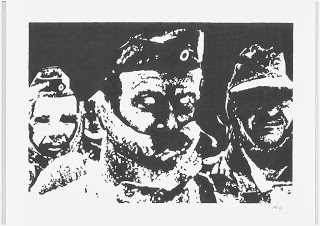
And, I pleased to note, that eminence noir, ABBA, is duly inspirational. A perfect rendition of a machine with human ambitions.
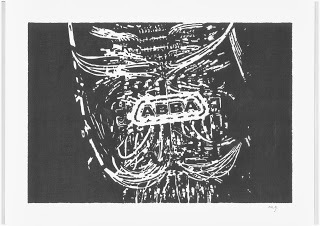

This shows Norma trapped in the basement hideaway during the battle for Warsaw. I really think Martina has caught Norma's feeling of hopelessness and vulnerability. A terrific picture.
Similarly, Marina coneys the misery associated with fighting in a bitterly cold winter.

And, I pleased to note, that eminence noir, ABBA, is duly inspirational. A perfect rendition of a machine with human ambitions.

Published on September 29, 2013 02:11
ZAGREB LITERARY FESTIVAL
ZAGREB FESTIVAL OF WORLD LITERATURE
I was invited to attend the Festival of World Literature my Croatian publishers, Fraktura, were organising. Never having been to that part of the world before, the answer was obviously ‘Yes’ and I am very pleased that I went. Fraktura is owned and run by Seid Serdarević and, as quickly became apparent, he sees Fraktura as something more than a business. Seid has a real passion for books, hence, the Literary Festival, which was as well-organised and as well-attended as any I’ve been to in the UK. As an indication of the care Seid and his staff had gone to, the programme was embellished with line drawings of all the thirty-odd writers who were speaking at the festival. This is mine (the work of Danko Friŝĉiĉ).
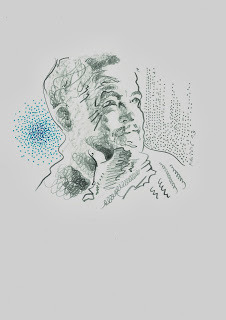 Rod Rees à la pointillism! I think it’s great.
Rod Rees à la pointillism! I think it’s great. I did one interview before the festival audience (conducted by a very sharp lady, Tanja Tolić) which I think went pretty well and then a panel discussion with two Croatian writers Franjo Janeŝ and Edo Popović. Here I was asked what I was working on next. My reveal that it’s an SF story featuring Nikola Tesla caused something of a reaction … I hadn’t realised that the theatre where I was speaking was on Nikola Tesla Street. Tesla is something of a national hero in Croatia (and in Serbia!) and I suppose there’s a worry that I might treat him with a lack of respect. As an indication I was approached after the panel discussion by a professor at Zagreb University enquiring if I had portrayed Tesla as homosexual: my answer that he is shown to be asexual seemed to put the guy’s mind at rest.
All-in-all three days well-spent. I loved Zagreb – a beautiful city which put me in mind of Paris – and the people were astonishingly well-read (they all spoke English too!). I’ll be going back but next time I’ll take Nelli along.
Many thanks to Said, all the staff at Fraktura, my interviewers Tonja and Iva and to a simply wonderful simultaneous interpreter whose name I didn’t catch.
Published on September 29, 2013 01:54
September 12, 2013
THE DEMI-MONDE: FALLThe last of the Demi-Monde series, Th...
THE DEMI-MONDE: FALL
The last of the Demi-Monde series, The Demi-Monde: Fall, has now been published. It seems remarkable that that’s it, journey’s end, five years of researching, writing and editing 650,000 words over.
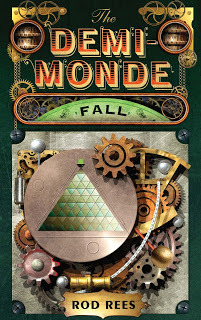 Two questions need to be asked. The first, was it worth it? And the second, given the time over again would you have done anything differently.
Two questions need to be asked. The first, was it worth it? And the second, given the time over again would you have done anything differently.Was it worth it? Yeah, of course. It’s quite a buzz to have your work ‘out there’ and being shelved alongside some of the authors admire.
Would I do it differently? Yeah, most definitely. I was much too ambitious especially with regards to the structuring of the books. What I intended was the four books to be one long narrative (a little Lord of the Rings-esque) with each volume having its own flavour to ensure that the reader had something new to pique his or her interest as he/she moved from Winter, to Spring, to Summer and finally to Fall. That’s why I ended each of the books on a cliff-hanger this to try to stimulate the reader into looking out for the next in the series. What I forgot was that by doing this it’s difficult for a reader to start anywhere but at the beginning because otherwise they would be lost.
So, if I could timewarp back five years I’d probably have made each of the books a stand-alone adventure and brought it all together in the final book of the series.
But I didn’t, so tough.
Anyway, the books are finished and it’s time to move on. Tesla, anyone?
Published on September 12, 2013 07:36
July 3, 2013
SURVEILLANCE: EDWARD SNOWDEN
The saga of Edward Snowden the whistleblower who dished the dirt about Prism and who has spent the last couple of weeks looking for somewhere/anywhere that will allow him asylum continues.
Reading the papers and the various blogs on the subject I get the impression that there is a lot of sympathy for Snowden and that the US administration’s attempts to have him extradited back to the States are considered a trifle excessive. This has been compounded by the nonsense when the jet carrying the Bolivian president was refused permission to enter the airspace of France, Italy, Spain and Portugal this on the grounds that there was a suspicion that Snowden was aboard the plane.
But is the reaction – the over-reaction – of the US authorities so surprising? They have invested billions in creating the most pervasive covert surveillance system in the world, one which seems to skirt the edge of legality and good-neighbourliness (at least as far as the Germans are concerned). Now the weak link in this system ( in all systems for that matter) is the people running it so when one of them goes AWOL (as Snowden has) it is essential that those running the system move heaven and earth to bring him to 'justice'. Not because he might have done something wrong (the morality of whistleblowing has to be judged on a case-by-case basis) but because of its deterrent effect on those toying with the idea of following the whistleblower's example.
It is a sine quo non of those organisations that have been betrayed that they bring the miscreant to ‘justice’ otherwise the old adage ‘who watches the watchers’ will be answered with ‘by the watchers with a sense of morality’ and that would never do. Surveillance and morality are the oil and water of the modern world.
Published on July 03, 2013 11:11
INVENT-1ON COVER IDEAS
Started to play around with ideas for the cover of Invent-10n. As the novella is concerned with the effects surveillance can have on society Nigel (Nigel Robinson, the designer I work with) thought that a series of monitor screens might be the way to go. We knocked the concept around a little and that's when I remembered the montage painting called 'Myra' created by the artist Marcus Harvey so I pitched the idea to Nigel of forming the image of an eye from a collage of monitor images showing pictures of one of the novella's principals, a singer called Jenni-Fur.
Fortunately I had a whole raft of photographs of Nelli (my jazz-singing wife) in performing mode so we used those. The result is this:
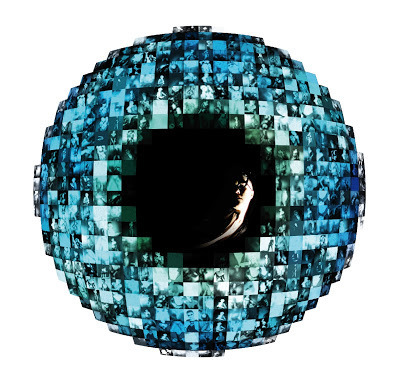 I'm really quite pleased with it. The debate now is how best to show the Book Title/Authors' Name. the radical approach would be just to have the 'eye' on the front cover but it's early days yet.
I'm really quite pleased with it. The debate now is how best to show the Book Title/Authors' Name. the radical approach would be just to have the 'eye' on the front cover but it's early days yet.
Fortunately I had a whole raft of photographs of Nelli (my jazz-singing wife) in performing mode so we used those. The result is this:
 I'm really quite pleased with it. The debate now is how best to show the Book Title/Authors' Name. the radical approach would be just to have the 'eye' on the front cover but it's early days yet.
I'm really quite pleased with it. The debate now is how best to show the Book Title/Authors' Name. the radical approach would be just to have the 'eye' on the front cover but it's early days yet.
Published on July 03, 2013 10:12
July 1, 2013
SURVEILLANCE: WHAT DID THE EUROPEANS EXPECT?
Der Spiegel’s revelations that the US National Security Agency has been surveilling European embassies and EU offices has generated the usual knee-jerk reactions. Luxembourg Prime Minister is quoted as saying, ‘The United States would be better off monitoring its secret services rather than its allies. We must get a guarantee from the very highest level now that this stops immediately.’ President of the EU parliament, Martin Schultz, said he was ‘deeply worried and shocked’ by the allegations.
Yeah, right.
Now the EU is either being led by the most naïve and out-of-touch bunch of bozos since the dawn of parliamentary democracy OR the EU is being led by the most naïve and out-of-touch bunch of bozos since the dawn of parliamentary democracy.
What did they expect?
The whole premise of surveillance, especially the deepnet surveillance practiced by the NSA, is that its aim is to prepare a full 360⁰ portrait of enemies extent and enemies future. Now seen through the NSA’s eyes the EU must be a rich vein of real and present threats. European capitals – London and Madrid – have been the target for attack by Islamic extremists and this sort of extremism is readily exportable and therefore a potential threat to the USA. Moreover, the impression I’ve always got when dealing with Americans is that they have a somewhat paternalistic view of European competence (understandable seeing as they had to dig us out of the mess created by two world wars) and hence would be loath to rely on European security services to monitor and control their indigenous terrorists. The temptation to give us a surreptitious hand must have been overwhelming.
Secondly, the best surveillance is that which has no gaps. If China or Russia believed that in order to protect European sensitivities Europe was a surveillance no-go zone they would have a field-day. Europe would become the soft underbelly of the USA. Moreover, to provide its leaders with a full view of what is going down in the world vis-à-vis China and Russia the NSA needs to know what is happening between the EU countries and these two super-powers.
So the Europeans can vaporise all they want but the NSA is going to go right on surveilling us … just, I suspect, as we are surveilling the Americans.
Published on July 01, 2013 01:17
June 5, 2013
WORLD BUILDING 101
WORLD BUILDING 101
I’ve agreed to ‘compere’ a session entitled ‘World Building’ at the up-coming ‘Furtura’ conference in Wolverhamption so I thought it would be an idea to think of the questions I could pose to the panellists … and, of course, my own answers to them.
So this, I guess, is Rod Rees’ ‘World Building 101’.
In writing fiction there are five elements – plot, theme, characters, style and setting – but in Science Fiction and Fantasy SETTING looms very large indeed. SF and Fantasy tales invariably need a bespoke world to serve as the stage on which the story plays out (actually I’m hard pushed to think of a SF/Fantasy book that hasn’t a setting unique to itself … ‘Flowers for Algernon’, perhaps?). The examples are legion: Orwell’s Oceania; Herbert’s Arrakis, Prachett’s Discworld; Tolkien’s Middle Earth, my own Demi-Monde. From this it’s obvious that World Building is a skill every SF/Fantasy writer needs in his or her tool box.
But as I know from bitter experience World Building isn’t easy so let’s look at the KEY INGREDIENTS that a New World must have or as I call it, the CONSISTENCY CRAMPS .
1. Your New World must be suitable for purpose. Remember this is the stage your characters will perform on and it must provide some – hopefully not all – of the pressures, dilemmas and threats your heroes must struggle with and triumph over. I say not all because it’s easy to lose yourself in world-building and to forget that it is, when all said and done, just a stage … it’s not a substitute for character interaction and dynamics. Think of your New World as another lead character and you won’t go far wrong. Personally I also like to reference my New Worlds with aspects of the Real World … it gives the readers an anchor against all the creative madness you have squalling around them.
2. Your New World must allow the reader to suspend disbelief. To do this your New World must be coherent and, above all, consistent. There is nothing more aggravating for a reader to invest his time entering and exploring a New World only to find that the writer couldn’t be arsed to remember it’s intricacies and foibles, or WORSE has to keep playing that dreaded surprise get-out-of-jail illogic card to get his hero out of a corner he or she has been written into. And to do this needs PLANNING (see point #3 below).
3. Your New World must be planned. Okay, so there’s a school of thought that the best way to develop a New World is just to dive right in and wing it. My view is that this is bollocks. At the very least the writer must understand the spatial co-ordinates of his New World – how all the elements (countries/planets/Zones of Frightfulness whatever) fit together – and for this you need a MAP! I’m not talking here of a supreme example of cartography, but at least a sketch of where everything fits (a piece of advice: if you want said map to feature in your published book don’t make it too complex – the Demi-Monde map suffers from this and is waaaaaaaay too small). Next up are the physical aspects of your New World (the physics/magic that applies there, the weather, geography, environment, biology, astronomy, zoology and so on … the stuff I hate doing) which make the New World believable. Sure these physical aspects might be fantastic but if they’re consistent, have a coherent logic and your characters believe in them then there’s no problem. Finally, we come to the interesting bit, the cultural/political/religious mores of the inhabitants populating your New World and who your characters have to interact with. I spend most time on these as they have the greatest impact on my protagonists. All-in-all New World building is a lot of work but if you want to suspend disbelief, the suspension starts here.Okay, so you’ve spent days/weeks/months/years constructing your New World and the temptation to ram all this effort into the first chapter of your magnum opus as one huge info-dump is almost irresistible. BUT you must resist, you must resist the RASH OF THE INFO-DUMP .
The old adage in fiction writing is show don’t tell (only if you’re a genius like Orwell are you permitted to ignore this maxim). So your aim must be to let the reader discover the New World in a natural, unforced sort of way with information coming their way via the observations and actions of your characters. Seduction rather than rape and all that. The solution I came up with for the Demi-Monde was two-fold. First I pinched an idea used by Frank Herbert in ‘Dune’ and had mini-info-dumps in the form of extracts for manuals etc. at the beginning of each chapter and, secondly, I put all of my hard work on display in the Demi-Monde web site. We come now to the URGE OF NEW LANGUAGE-ITIS which must, at all costs be controlled. Not many of us are philologists like Tolkien so the subject of a writer developing a new language/vocabulary/series of terminologies to be used in their New World is (to me, anyway) a thorny one. My experience is that publishers (and a great many readers) HATE anything that smacks of a new language so the policy I’ve adopted is to use new words only when they convey new meanings. Unfortunately as the Demi-Monde was my first series I didn’t heed this warning and I thought to spice things up by using punning words rendered camel-case style (HimPerialism, ImPuritanism et al) and the kicking that I got from some (thankfully a minority) of readers was profound. So be VERY careful before you introduce a new language. And please be especially careful in naming your protagonists: if I see one more name rendered as Hzzzhgsdhyfi or something equally silly I think I’ll hurl chunks. Multiple ‘Zs’ do not an exotic name make.
Right, now we’re onto the CURSE OF THE CLICHÉ. There are a lot of SF/Fantasy writers out there all busily constructing worlds, some of them very, very similar. I mean, if I see one more story set in a faux-mediaeval world beset by wizards and witches, or a US High School plagued by vampires, murder will be done. Come on, kids, you can do better than that. Think outta the box!Okay, nearly over. We now come to the CONDESCENDING ADVICE bit. If I was asked what I had learnt from building the Demi-Monde it would be:
1. Once you’ve built a world you must abide by the restrictions you’ve imposed on it (nothing unsuspends disbelief faster than inconsistency) and that means having a reference (please make notes otherwise you’ll be continually flipping back thru your manuscript checking whether the vampire-infested Blood Lands are to the north or south of the werewolf-dominated Pack Lands or some such unproductive shit. And
2. The world must be real to the characters you have living, working, struggling inside it. You may think it’s weird as hell to have variable gravity or time that flows at different rates during the day but to your characters living in this New World, that’s the way it is. Don’t have them saying ‘Gosh, that’s a surprise,’ every time you lay something odd on your reader.That’s it. I hope it helps! Enjoy your building.
Published on June 05, 2013 10:12
May 10, 2013
THE DEMI-MONDE FALL 3
 This is the third of the plates that will be included in 'The Demi-Monde: Fall' I'm not sure why I chose Edinburgh to nuke - I went their on my honeymoon and thought it a fine city - but I needed somewhere to waste so the bad guys could convince the good guys to be PINC'd.
This is the third of the plates that will be included in 'The Demi-Monde: Fall' I'm not sure why I chose Edinburgh to nuke - I went their on my honeymoon and thought it a fine city - but I needed somewhere to waste so the bad guys could convince the good guys to be PINC'd.I've been playing around with PINC thinking about building a story around it and to this end I've beefed up the definition.
PINC (Personal Implanted nanoComputer) is a neurochip developed by ParaDigm CyberResearch. When implanted in a human brain, PINC gives instant access to the databases held on ParaDigm CyberResearch’s quantum computer, ABBA, which provides each PINC-equipped individual – known as PINCs – with 3 yottaQuFlops of cybermemory, the equivalent to every book, newspaper, instruction manual and leaflet produced since the invention of the written word: PINC has been described as the humankind’s ‘sixth sense’. Additionally, PINCs have the ability to communicate, PINC-to-PINC, via the medium of the ABBA-platformed PolyNet, this communication being known as TelePathy. It is estimated that as of November, 2040, 50% of the world’s population – 4.5 billion humans – have been PINC-equipped. Since it was first trialled in 2015, PINC has been responsible for most of the major economic, political, social and cultural shifts that the world has experienced, including the development of the pan-global, anti-PINC political movement known as The Natural Mind Party. The true impact of PINC on the human brain was revealed in the Reynolds Enquiry, the findings of which were published in 2040.
Published on May 10, 2013 09:35
May 4, 2013
noöPINC
Just finalising the artwork for ‘the Demi-Monde: Fall’. This is noöPINC – the 2nd-generation Personal Implanted nanoComputer – that features heavily (and crucially) in the book. NoöPINC is a cyborg-virus – a virus with man-made elements incorporated into its structure – these nanocybernetic structures acting as inception points for the development of the virus. The virus grows around them and by doing so absorbs the artificial elements into its genetic structure. Artwork as always by Nigel Robinson.
 Got to say I'm bloody pleased with it. Sort of captured the somewhat creepy aspect of the device. Well done, Nigel!
Got to say I'm bloody pleased with it. Sort of captured the somewhat creepy aspect of the device. Well done, Nigel!
Published on May 04, 2013 07:31
Rod Rees's Blog
- Rod Rees's profile
- 26 followers
Rod Rees isn't a Goodreads Author
(yet),
but they
do have a blog,
so here are some recent posts imported from
their feed.



